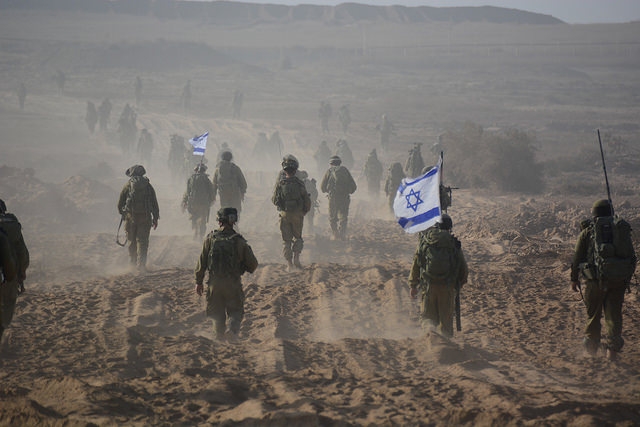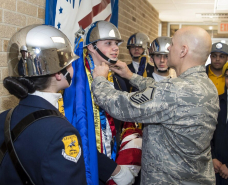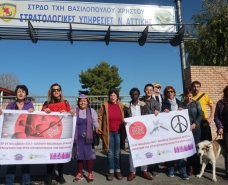Israel’s army and schools work hand in hand, say teachers

By Jonathan Cook, Middle East Eye
Close ties means Israeli pupils are being raised to be "good soldiers" rather than good citizens
HAIFA - The task for Israeli pupils: to foil an imminent terror attack on their school. But if they are to succeed, they must first find the clues using key words they have been learning in Arabic.
Arabic lesson plans for Israel’s Jewish schoolchildren have a strange focus.
Those matriculating in the language can rarely hold a conversation in Arabic. And almost none of the hundreds of teachers introducing Jewish children to Israel’s second language are native speakers, even though one in five of the population belong to the country’s Palestinian minority.
The reason, says Yonatan Mendel, a researcher at the Van Leer Institute in Jerusalem, is that the teaching of Arabic in Israel’s Jewish schools is determined almost exclusively by the needs of the Israeli army.
Mendel’s recent research shows that officers from a military intelligence unit called Telem design much of the Arabic language curriculum. “Its involvement is what might be termed an ‘open secret’ in Israel,” he told MEE.
“The military are part and parcel of the education system. The goal of Arabic teaching is to educate the children to be useful components in the military system, to train them to become intelligence officers.”
Telem is a branch of Unit 8200, dozens of whose officers signed a letter last year revealing that their job was to pry into Palestinians’ sex lives, money troubles and illnesses. The information helped with “political persecution”, “recruiting collaborators” and “driving parts of Palestinian society against itself”, the officers noted.
Mendel said Arabic was taught “without sentiment”, an aim established in the state’s earliest years.
“The fear was that, if students had a good relationship with the language and saw Arabs as potential friends, they might cross over to the other side and they would be of no use to the Israeli security system. That was the reason the field of Arabic studies was made free of Arabs.”
Officers in classroom
The teaching of Arabic is only one of the ways the Israel Defence Forces (IDF), as the Israeli military is known, reaches into Israeli classrooms, teachers and education experts have told MEE.
And many fear that the situation will only get worse under the new education minister, Naftali Bennett, who heads Jewish Home, the settler movement’s far-right party.
Most Jewish children in Israel are subject to a military draft when they matriculate from high school at the age of 17. Boys usually serve three years, and girls two.
However, the army and the recent right-wing governments of Benjamin Netanyahu have been concerned at the growing numbers who seek exemptions, usually on medical, psychological or religious grounds.
Nearly 300 schools have been encouraged to join an IDF-education ministry programme called “Path of Values”, whose official goal is to “strengthen the ties and cooperation between schools and the army”.
In practice, say teachers, it has led to regular visits to schools by army officers as well as reciprocal field trips to military bases for the children, as a way to encourage them to enlist when they finish school.
Although what takes place during visits is rarely publicised, the Israeli media reported in 2011 that on one simulated shooting exercise children had to fire their weapons at targets wearing a keffiyeh, or traditional Arab headdress.
“Militarism is in every aspect of our society, so it is not surprising it is prominent in schools too,” said Amit Shilo, an activist with New Profile, an organisation opposed to the influence of the army on Israeli public life.
“We are taught violence is the first and best solution to every problem, and that it is the way to solve our conflict with our neighbours.” Read more here.
Source: Middle East Eye
Photo: Israel Defence Forces
Countering Military Recruitment

WRI's new booklet, Countering Military Recruitment: Learning the lessons of counter-recruitment campaigns internationally, is out now. The booklet includes examples of campaigning against youth militarisation across different countries with the contribution of grassroot activists.
You can order a paperback version here.







